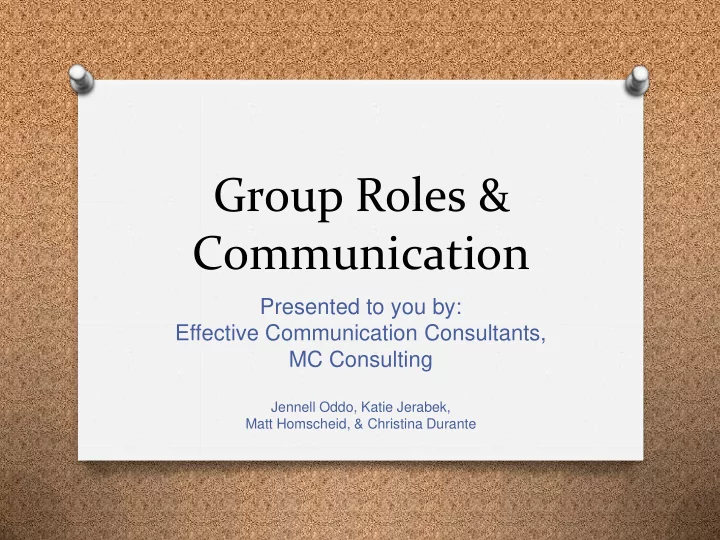

Group Roles & Communication Presented to you by: Effective Communication Consultants, MC Consulting Jennell Oddo, Katie Jerabek, Matt Homscheid, & Christina Durante
Recap of Previous Modules & Preview of Future Modules O Target Audience: Resident Assistants O Cohesiveness O Without some sort of cohesiveness, it is hard for groups to reach common goals. O Listening O Being an effective listener is also important to working in a successful group. Without a sense of cohesion, group members may not have an incentive to listen to other members and being an effective listener may be difficult. O Group Roles O This segment follows the listening portion of the program because listening is a key aspect to certain roles. Each member of a group plays a vital role in how the group functions and communicates. Understanding these roles is crucial for group success. O Leadership O The last part of training session revolves around leadership. Different types of leadership are relevant to different scenarios, and to be a successful leader, one needs to able to build group cohesiveness, be an effective listener, and understand how group roles coordinate.
Objectives http://www.youtube.com/watch?v=BignPBV32Sk O At the end of this session, you will be able to list task, maintenance, and self-centered roles, as well as their different characteristics. O At the end of this session, you will be able to reflect upon and recognize roles that you have played in the past. O At the end of this session, you will be able to assess which roles need to be taken on in your staff in order to maintain effective communication.
What types of roles are there? O Task-Oriented Roles : Task roles are taken on by people who are solely concerned with what the group needs to accomplish. O Examples: initiator-contributor, coordinator, elaborator, orienter, evaluator-critic, etc. O Maintenance-Oriented Roles : Maintenance roles are taken on by people who are concerned with relationships amongst group members. O Examples : harmonizer , gatekeeper-expediter, follower, standard setter, etc. O Self-Centered Roles : Self-centered roles can result in unnecessary conflict and hinder the group’s progression. O Examples: aggressor, blocker, joker-clown, dominator, etc.
Discuss O Get together with your staff and discuss which roles you tend to see yourself playing and why. O Scenarios O You have a problem with one of your residents. You have discovered that this resident is continually smoking pot and not attending class. You decide that it would be best to meet with your staff and decide what to do about the resident.
Review Objectives O List task-oriented, maintenance-oriented, and self-centered roles (and characteristics of these roles). O Recognize that roles that you have played in the past and can play in the future. O Assess which roles need to be taken on in your staff to ensure that your staff is communicating as efficiently as possible.
Recommend
More recommend